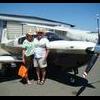Hi there,my immediate thoughts after reading your situation ,was to avoid night flying and instead try some creative time management to at least take advantage of what weather and daylight provide you.At the very least ,for this time of year.This isn’t ,what you want to hear ,but with a young family dependent on you ,low time pilot (assuming less than 250 hrs required for commercial)Assuming no instrument or very low time in actual,flying older C model with average equipment,late fall into winter In Northern location,fatigue from long work day,young family etc,night time preflight increasing chance of missing something,airports with closed night time towers and weather reporting,ability to see and avoid ground fogs as the temp decreases,loss of situational awareness occurring for the best of pilots.All pushing the risk factors to JFK jr level.Notice ,I have not mentioned the the loss of an engine ....others have pointed out how peaceful flying over cities at night...LA basin is so well lit up ,an emergency landing is practically a daytime visual affair.Others didn’t mention the time of year,summer with partial daylight or twilight at 930 pm?Lastly,you dont mention why you are pursuing a Commercial in the first place.Job transition to flying job?At 250 hrs,the only jobs I can think of are CFI,glider towing,banner towing,photography,ag work (Maybe)seasonal air taxi...If is the long term aircarrier requiring an ATP...than what’s the rush?At that ,level ,you are embarked on a multi year mission so that imo the risk to reward ratio for running night time ops in fall/winter just to build time is not worth the risk.Either way you decide ,fly safe



